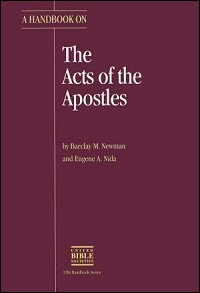Our understanding of the Greek New Testament is based almost entirely on English translations, but how would our understanding of the Greek text change if we read it for what it is: as Greek? With The Lexham Discourse Greek New Testament, we can now get behind the words of the New Testament writers and discover the particular linguistic tasks that inform translation and interpretation.
The Greek Text
22 οἱ δὲ παραγενόμενοι ὑπηρέται οὐχ εὗρον αὐτοὺς ἐν τῇ φυλακῇ ἀναστρέψαντες δὲ ἀπήγγειλαν
23 λέγοντες ὅτι Τὸ δεσμωτήριον εὕρομενκεκλεισμένον ἐν πάσῃ ἀσφαλείᾳ καὶ τοὺς φύλακας ἑστῶτας ἐπὶ τῶν θυρῶν ἀνοίξαντες δὲ ἔσω οὐδένα εὕρομεν ”
24 ὡς δὲ ἤκουσαν τοὺς λόγους τούτους ὅ τε στρατηγὸς τοῦ ἱεροῦ καὶ οἱ ἀρχιερεῖς διηπόρουν περὶ αὐτῶν τί ἂν γένοιτο τοῦτο
25 παραγενόμενος δέ τις ἀπήγγειλεν αὐτοῖς ὅτι Ἰδοὺ οἱ ἄνδρες οὓς ἔθεσθε ἐν τῇ φυλακῇ εἰσὶν ἐν τῷ ἱερῷ ἑστῶτες καὶ διδάσκοντες τὸν λαόν
26 τότε ἀπελθὼν ὁ στρατηγὸς σὺν τοῖς ὑπηρέταις ἦγεν αὐτοὺς οὐ μετὰ βίας
Runge, S. E. (2008–2014). The Lexham Discourse Greek New Testament (Ac 5:22–23). Lexham Press.
Translation
The English Standard Version™ is founded on the conviction that the words of the Bible are the very words of God. And because the words themselves—not just the thoughts or ideas—are inspired by God, each word must be translated with the greatest precision and accuracy.
22 But when the officers came, they did not find them in the prison, so they returned and reported,
23 “We found the prison securely locked and the guards standing at the doors, but when we opened them we found no one inside.”
24 Now when the captain of the temple and the chief priests heard these words, they were greatly perplexed about them, wondering what this would come to.
25 And someone came and told them, “Look! The men whom you put in prison are standing in the temple and teaching the people.”
26 Then the captain with the officers went and brought them, but not by force, for they were afraid of being stoned by the people.
The Holy Bible: English Standard Version (Ac 5:22–26). (2016). Crossway Bibles.
Commentary
This set of detailed commentaries provides valuable exegetical, historical, cultural, and linguistic information on the original text. Over the years this series has been instrumental in shedding light on the Scriptures so that translators all over the world could complete the important task of putting God’s Word into the many languages spoken in the world today.
The officials (see 13:5) are either officers of the Jewish Council or Levites of the temple guard under the officer in charge of the temple guards (see v. 24). In some languages the term officials is equivalent to “policemen.” In other instances the closest equivalent is “soldiers.”
To the Council has been added to the verb they returned in order to indicate to what place they returned.
The verb reported may be rendered as “said to the men in the Council.”
When we arrived at the jail is implicit in the Greek text and the TEV has made this information explicit. Most translators prefer to render without a transitional (NEB “we found the jail securely locked”).
The phrase found it locked up tight may require some slight modification since in some languages one does not “lock a jail,” but rather one “locks the doors of the jail”; therefore, “found the doors securely locked.”
The clause all the guards on watch at the gates is equivalent in many languages to “all the soldiers carefully guarding the doors.”
There is a potential problem in the phrase did not find anyone inside. This could be interpreted to mean that the angel of the Lord led out not only the apostles but all of the criminals in the jail. Some translators have therefore preferred to render this as “did not find either of the apostles inside.” Note that in verse 24 the concern is only for the apostles who had apparently escaped.
The officer in charge of the temple guards is the same term used in 4:1 They wondered what had happened to the apostles is one possible meaning of the difficult Greek expression in this verse. Goodspeed (“they were very much at a loss as to what would come of it”) and JB (“they wondered what this could mean”) are two other possible translations of this somewhat puzzling expression.
The location indicated by in must be made more specific in some languages, for example, “into the Council” or “where the leaders were gathered together.”
The particle translated listen may have the force of “at this very moment” (see JB). It is the same particle that the TEV translates right now in 5:9 and suddenly in 1:10.
The reference to standing is again not so much a designation of posture as one of location.
In some languages the relationship between standing and teaching is expressed by two closely combined clauses: “they are in the temple; they are teaching the people.”
The officer is the same word used in verse 24, the officer in charge of the temple guards.
Many languages are quite specific in the use of terms such as brought … back. In this context a rendering may be “caused them to return with them” or “commanded them to return with them.” The text clearly states that no physical force was used.
In order to indicate clearly that they did not use force, one may say in some languages “they did not grab them” or “they did not tie them up.” In other languages a common expression is “they did not beat them.”
It is important that in the final clause the goal of the stoning is the officer and the soldiers, not the apostles.
Newman, B. M., & Nida, E. A. (1972). A handbook on the Acts of the Apostles (pp. 125–126). United Bible Societies.


